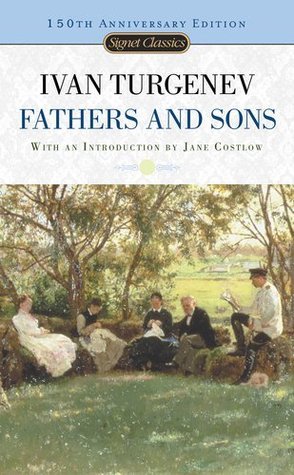Fathers and Sons Book Summary
TL;DR
Fathers and Sons by Ivan Turgenev examines the generational conflict in 19th-century Russia through the character of Bazarov, a radical nihilist, whose beliefs challenge the values of his aristocratic surroundings, leading to profound transformations in relationships and societal views.
What is Fathers and Sons about
Fathers and Sons is a seminal novel that delves into the generational tensions existing in 19th-century Russian society. Central to the narrative is Bazarov, a revolutionary figure who embodies the nihilistic philosophy challenging the traditional views held by the older generation, particularly represented by Arkady Kirsanov's father. The novel intricately weaves themes of love, politics, and societal change amid the backdrop of a country on the brink of revolution. Turgenev's work not only stirred controversy upon its release, as it polarized both the youthful radicals and the conservative aristocracy, but it also garnered praise for its nuanced characterizations and psychological depth, solidifying its place as one of the greatest literary achievements of its time.
Fathers and Sons 7 Key Takeaways
Bazarov arrives at the Kirsanov estate.
Bazarov, a nihilistic student, visits the estate of his friend Arkady Kirsanov, where his radical ideas immediately create discomfort among the aristocratic family.
Conflict between Bazarov and Arkady's father.
The tension escalates as Bazarov's rejection of traditional values comes into direct conflict with Arkady's father, generating heated debates about life, love, and the future of Russia.
Bazarov's romantic entanglements.
Bazarov develops feelings for a young woman, Anna, which complicates his nihilistic principles, showcasing the struggle between personal desires and ideological beliefs.
Bazarov falls ill.
As Bazarov's health deteriorates, the impact of his ideas and the relationships he has formed begin to take a toll, leading to a poignant reflection on life and death.
Bazarov's death and its aftermath.
In his final moments, Bazarov's nihilism is challenged by the emotional connections he has made, leaving Arkady and others to contemplate their own paths amidst societal changes.
Arkady marries Katya.
After Bazarov's death, Arkady marries Katya, representing a shift towards embracing traditional values while navigating the growing complexities of modern life.
Resolution of family dynamics.
The novel concludes with a sense of reconciliation among the Kirsanov family, as they adapt to their new realities shaped by the ideological struggles of the past.
Top Fathers and Sons Quotes
- "You see, the only thing that matters is to live and to love, to live fully and freely."
- "In our time, it is not enough to simply exist; one must exist meaningfully."
- "Every generation is a new reason to explore the depths of our understanding and the heights of our dreams."
Who should read Fathers and Sons?
Fathers and Sons appeals to readers interested in classic literature, particularly those fascinated by themes of generational conflict, societal change, and psychological depth. This novel offers profound insights into the dynamics of love and ideology, making it a thought-provoking read for anyone reflecting on the complexities of human relationships and the evolution of societal values.
Fathers and Sons Best Reviews
- Turgenev's Fathers and Sons deftly captures the tumult of generational conflict with unmatched psychological insight, making it an essential read for understanding 19th-century Russian thought.
- This novel is a brilliant depiction of the clash between radical ideals and traditional values, offering timeless reflections on the nature of change and human relationships.
- Fathers and Sons remains a powerful exploration of love, politics, and the inevitable generational divides that resonate strongly even in modern times.
People also liked these summaries
Fathers and Sons FAQs
What themes are explored in Fathers and Sons?
The novel explores themes such as generational conflict, love, societal change, and the tension between traditional values and radical ideologies in 19th-century Russia.
Why is Fathers and Sons considered controversial?
Upon its release, the novel was criticized by both radicals and conservatives for its portrayal of nihilism and the generational divide, reflecting the broader sociopolitical tensions of the time.
What is the significance of Bazarov's character?
Bazarov represents the revolutionary spirit of the younger generation, challenging the status quo and embodying the nihilistic ideals that provoke conflict and reflection among the characters.
